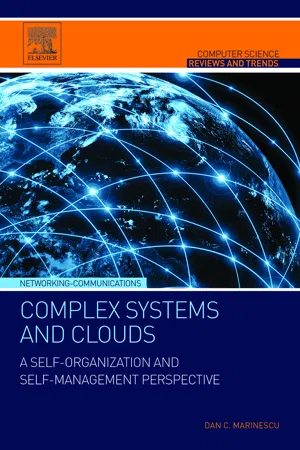
Complex Systems and Clouds
A Self-Organization and Self-Management Perspective
- 238 pages
- English
- ePUB (mobile friendly)
- Available on iOS & Android
About this book
Complex Systems and Clouds: A Self-Organization and Self-Management Perspective provides insights into the intricate world of self-organizing systems. Large scale distributed computer systems have evolved into very complex systems and are at the point where they need to borrow self-adapting organizing concepts from nature.The book explores complexity in big distributed systems and in the natural processes in physics and chemistry, building a platform for understanding how self-organization in big distributed systems can be achieved. It goes beyond the theoretical description of self-organization to present principles for designing self-organizing systems, and concludes by showing the need for a paradigm shift in the development of large-scale systems from strictly deterministic to non-deterministic and adaptive.- Analyzes the effect of self-organization applied to computer clouds- Furthers research on principles of self-organization of computing and communication systems inspired by a wealth of self-organizing processes and phenomena in nature and society- Presents a unique analysis of the field, with solutions and case studies
Tools to learn more effectively

Saving Books

Keyword Search

Annotating Text

Listen to it instead
Information
Complex Systems
Abstract
Keywords
1.1 The Thinking on Complex Systems Through the Centuries
Table of contents
- Cover image
- Title page
- Table of Contents
- Copyright
- Dedication
- Preface
- Chapter 1: Complex Systems
- Chapter 2: Nature-Inspired Algorithms and Systems
- Chapter 3: Managing Complexity of Large-Scale Cyber-Physical Systems
- Chapter 4: Computer Clouds
- Chapter 5: Cloud Self-Organization and Big Data Applications
- Bibliography
- Index
Frequently asked questions
- Essential is ideal for learners and professionals who enjoy exploring a wide range of subjects. Access the Essential Library with 800,000+ trusted titles and best-sellers across business, personal growth, and the humanities. Includes unlimited reading time and Standard Read Aloud voice.
- Complete: Perfect for advanced learners and researchers needing full, unrestricted access. Unlock 1.4M+ books across hundreds of subjects, including academic and specialized titles. The Complete Plan also includes advanced features like Premium Read Aloud and Research Assistant.
Please note we cannot support devices running on iOS 13 and Android 7 or earlier. Learn more about using the app